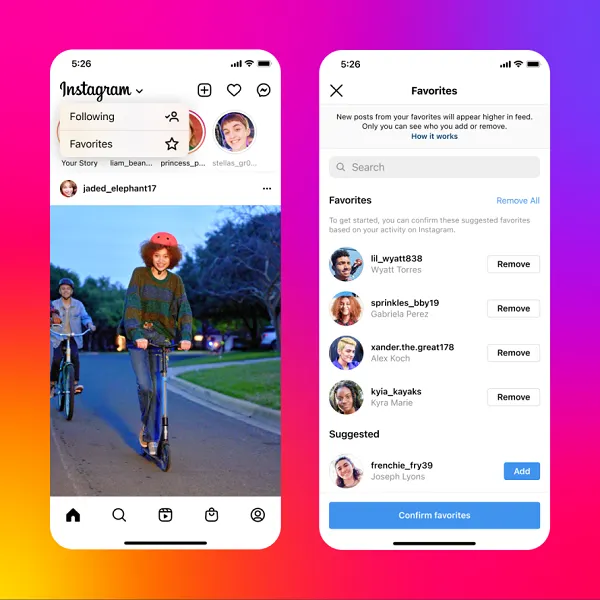Meta May Be Forced to Offer Default Chronological Timelines in its Apps
October 5, 2025
This might seem like a minor case, and another example of EU overreach in policing social media platforms. But a finding late last week by a Dutch court that Meta has to provide more easily accessible non-algorithmic feed options could have big implications, and will become a bigger focus point for regulators moving forward.
Last Thursday, a Dutch court ruled that Meta has to provide Facebook and Instagram users with more easily accessible options for non-algorithm-defined timelines, in line with regulations outlined in the EU Digital Services Act (DSA).
The case, which was brought by digital rights group “Bits of Freedom,” claims that Meta is currently acting in violation of Article 27 of the DSA, which states that:
“Providers of online platforms that use recommender systems shall set out in their terms and conditions, in plain and intelligible language, the main parameters used in their recommender systems, as well as any options for the recipients of the service to modify or influence those main parameters […] Where several options are available for recommender systems that determine the relative order of information presented to recipients of the service, providers of online platforms shall also make available a functionality that allows the recipient of the service to select and to modify at any time their preferred option.”
So under the DSA, Meta, and all large social platforms, need to share insight into how their algorithmic amplification works, and also allow users to update their preferences to modify their in-app experience.
But more specific to this case, the DSA also notes that:
“That [selection and modification] functionality shall be directly and easily accessible from the specific section of the online platform’s online interface where the information is being prioritized.”
In other words, the option to modify what you’re being shown in each app needs to be “directly and easily accessible” from the feed that’s being defined by any such algorithm.
To be clear, Meta does offer options to select a chronological timeline in both apps, which it added back in 2022 on response to regulatory concerns about user choice (in various regions)

So you can do this, but you can’t set your preference as the default, and Meta knows that most people won’t bother to change it.
Which Bits of Freedom says works in Meta’s benefit:
“Meta has an interest in steering users toward a feed where it can show as many interest‑ and behavior‑based ads as possible. That is the core of Meta’s revenue model. Subtle design techniques push users toward that feed, while the non‑profiled feed is hidden behind a logo, making it hard to find. Users who do choose the alternative timeline also lose direct access to features such as Direct Messages. Moreover, when you open the app, it always starts with Meta’s feed, even if the user selected a different one before. Because of the judge’s ruling, Meta must change its behavior.”
So now, if this ruling is upheld (Meta has said that it will appeal), Meta may be forced to allow people to opt out of its algorithmic timeline entirely, which would revert users to a purely chronological feed in each app, and set that as the default.
Which Meta itself does not want to happen, and does not think will lead to a better user experience.
Late last year, Instagram chief Adam Mosseri explained that non-algorithm feeds don’t work anymore, despite people thinking that they want this, with the usage data they’ve found from experimenting with such actually showing the opposite.
As per Mosseri:
“We’ve tested [non-algorithm feeds] and tried it a number of times. Every time we have, there’s a sub-group of people who are happy, there’s a bunch of people who forget that they’re in it, and then overall, everybody who’s in it uses Instagram less and less over time. And when we ask them questions like “how satisfied are you with Instagram?”, they actually report being less happy with Instagram more and more over time, on average. And then there’s these second-order effects where their friends start using Instagram less [and] because they use it less, they send less likes and comments, messages, and then there’s all of this other stuff, and it just gets worse and worse, and quickly.”
So Meta, of course, wants to maximize engagement, and keep people in its apps for longer, while also gathering valuable response signals from such. Algorithm-defined feeds better facilitate this, so from a business, and according to Mosseri, a user satisfaction perspective, algorithm feeds are just better, and Meta doesn’t want to give people an easy opt-out.
But algorithms have also been identified as a key cause of angst and division, with the incentive of algorithms being, primarily, engagement above all else.
And what drives engagement? Emotional response, and with the strongest drivers of emotional response being fear, anger and joy, you can see how algorithmic amplification can fuel the fires that lead to greater dispute and opposition, based solely on these engagement triggers as data points.
That was the case put forward by Frances Haugen, a former Facebook staffer turned whistleblower, who sparked various regulatory investigations into the company as a result of her insight into its operational approach, and lack of concern within such for user impacts.
Haugen’s main contention was that the elimination of engagement-based ranking would help to reduce division caused by social media apps, by limiting the amount of rage-baiting posts that are presented to the millions of people using them every day. That would also reduce the incentive for publishers to produce such content as a means to get attention, and thus, impact the broader news ecosystem towards more measured, balanced reporting.
And there is some logic to that. It wouldn’t eliminate the motivation behind such entirely (as users would still be able to share posts, amplifying them either way). But by reducing the drivers that incentivize angst and division, that seems like a logical evolution that aims to address such concerns.
But it would impact the revenue opportunities of social apps, as usage would inevitable decline, as noted by Mosseri. But maybe that’s worth it, and maybe, if this Dutch decision is upheld, we could actually get our first real look at the impacts of such at scale, if Meta is indeed forced to implement non-algorithmic feeds as a default in certain markets.
It likely is worth a larger-scale experiment, but Meta is certainly not going to volunteer for such.
The Dutch court has ruled that Meta has two weeks to offer users a “direct and simple” way to opt out of a timeline with recommended content (again, Meta is appealing the verdict).
Search
RECENT PRESS RELEASES
Related Post



